Covid-19: 'Many deaths' without NI lockdown
- Published
- comments
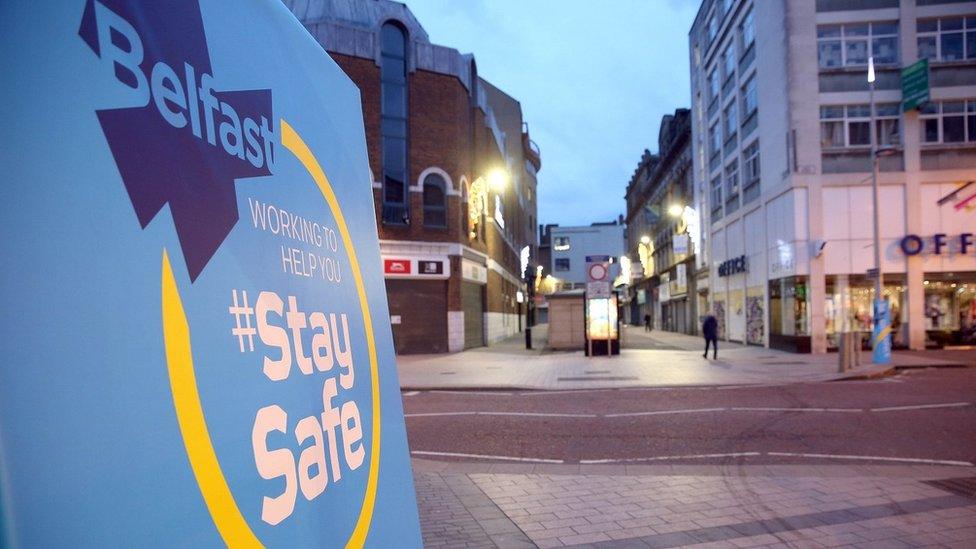
NI's chief scientific adviser has said that without a six-week lockdown, the number of deaths and hospital admissions would be "severe".
New measures will begin on 26 December with non-essential shops closing after Christmas Eve.
Prof Ian Young said if an "epidemic" is allowed to proceed in "an uncontrolled way", then inevitably there will be "many deaths."
Lockdown would allow hospital staff to cope, he said.
"While there will be huge pressures on the hospital system in January it should allow our colleagues to cope," Prof Young told BBC Radio Foyle.
"If you allow the epidemic to proceed in an uncontrolled way, you allow everybody if they choose to live their lives completely as normal with a dangerous virus in circulation, then inevitably there will be very severe consequences and many, many deaths."
'Return to March lockdown'
Northern Ireland's new six-week Covid-19 lockdown is essentially a return to March's sustained restrictions, Health Minister Robin Swann has said.
Hair salons and close-contact services will close. Pubs and restaurants will be restricted to takeaway services.
Tighter measures will be in place for a week from 26 December with no gatherings allowed between 20:00 GMT and 06:00.
Mr Swann said the "short, sharp interventions" introduced in October had not worked, so the executive was returning to the level of restrictions which helped curb infection rates earlier in the year.
The reproduction rate - or rate at which the virus spreads - is currently 1 to 1.2, but there are fears it could rise to between 1.4 and 1.8 over Christmas.
Business organisations have warned the new lockdown could "sound the death knell" for many firms.
On Friday, a further 12 Covid-linked deaths were recorded in NI and there were a further 510 cases of the virus.
It brings the Department of Health's death toll to 1,166.
In the Republic of Ireland, six virus-related deaths were recorded, with 582 new cases also confirmed.
What are the restrictions?
The Christmas gathering arrangements - where households have chosen to form a Christmas bubble for a period of time between 23 to 27 December with provision for travel a day either side when absolutely necessary - will be allowed to proceed.
But during the first week of the lockdown, people are urged only to leave their home for essential reasons. Between 20:00 and 06:00 from 26 December until 2 January:
All businesses, including essential shops, must close
No indoor or outdoor gatherings of any kind will be permitted, including at sporting venues
Outdoor exercise will be permitted only with members of your own household.
No household mixing will be permitted in private gardens or indoors in any setting, except for emergencies or the provision of health or care services
No sporting events will be permitted at all - even at elite level
Mr Swann said the measures were being brought in "with a heavy heart" and there was no intention to extend these advanced restrictions beyond the first week, as he was mindful of the effect the last year has had on lives and livelihoods.
But he added: "A heavy responsibility will rest on all of us to remain at home as much as possible over the course of the six-week period."
The restrictions for this period include:
Closure of hospitality and non-essential retail with a stricter demarcation between essential and non-essential retail than that deployed during the recent circuit breaker
Click-and-collect retail will not be permitted, and homeware will not be categorised as essential retail
Off sales (including from bars) will be permitted from 08:00 on Monday to Saturday, and from 10:00 on Sunday, until 20:00 on any day
Hospitality businesses will only be allowed to offer takeaway and delivery food
Closure of close-contact businesses
Places of worship can remain open under strict conditions
MoT centres are expected to stay open
Clarification is to be given on where vehicles can be washed ahead of MoT
Tradespeople are expected to be allowed into homes for essential maintenance
Childcare bubbles will continue
Formal shielding will not resume, but "stronger advice" will be issued
Justice Minister Naomi Long has confirmed that jury trials and other court and tribunal proceedings will go ahead during the lockdown, within public health guidelines.
Mr Swann said discussions were taking place between the health and education departments over what additional factors could be put in place in schools, amid speculation as to when schools can return after the Christmas holiday.
About a third of Northern Ireland's care homes - and 10,000 of their residents - had now received the first dose of the Pfizer vaccinations, he added, describing the vaccine rollout as the "start of fighting back".

'Effectively a curfew'

We've had the "softly, softly" approach - now it appears the executive is going to use the stick.
The decision arrived at by ministers was, we're told, unanimous and they could not ignore the scenes of ambulances queued outside hospitals this week and severe pressures on the system.
The changes mean Boxing Day and new year's celebrations are going to be nothing like what we've ever had before - the initial measures in the first week of lockdown are an attempt to clamp down on house parties and suppress the virus.
But there's no doubt this will be a hard sell in some respects - getting people to wilfully comply with what effectively amounts to a curfew will be not be easy.
We're told visibility of the police will also increase that week, but there's been little detail about additional enforcement.
Northern Ireland is ending 2020 on a sombre note and going into 2021 with a difficult task ahead - to try to get back to a place where an unpredictable virus can be brought under some sort of control.
Read more: NI Covid-19 restrictions: Your questions answered

There had only been five days since 21 October when hospital occupancy has been below 95%, said Chief Medical Officer Dr Michael McBride.
When occupancy rises above 90%, he said, there was an increased risk of harm to patients.
"This is a wave on a wave... and the risk is we swamp our health service," he warned.
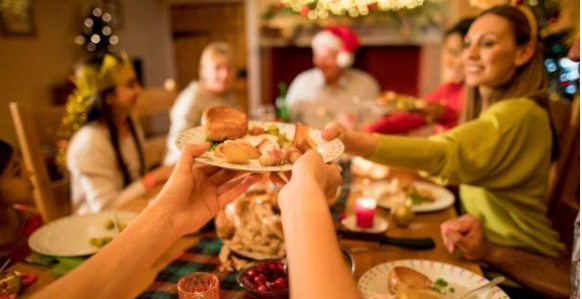
Pre-arranged Christmas bubbles can still go ahead
Dr McBride urged people to behave as they did in March, when the restrictions and behaviour saw the R number fall from almost 3, down to 0.7 by July.
In its modelling, the Department of Health said it anticipated case numbers would continue to rise as Christmas approached.
Reduced testing might lead to a lower number of reported cases over the holiday period, but this would not be indicative of reduced community transmission, it said.
"Hospital admissions will remain stable or increase slightly until shortly before Christmas when they will begin to rise again."

SOCIAL DISTANCING: Can I give my friends a hug?
FACE MASKS: When do I need to wear one?
TESTING: How do I get a virus test?

Related topics
- Published29 July 2021

- Published18 December 2020
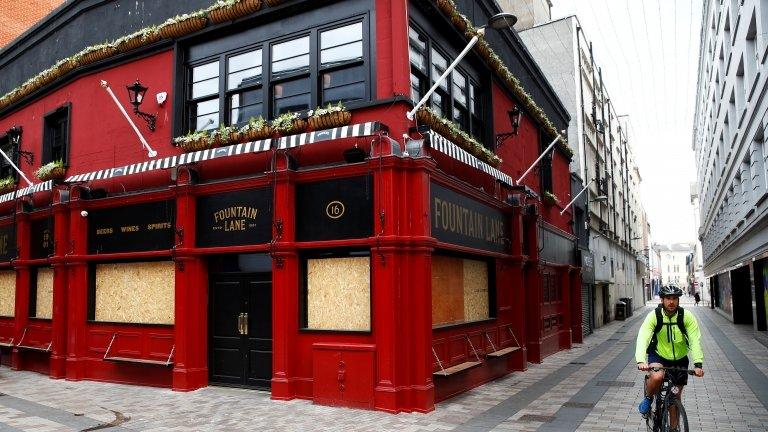
- Published18 December 2020
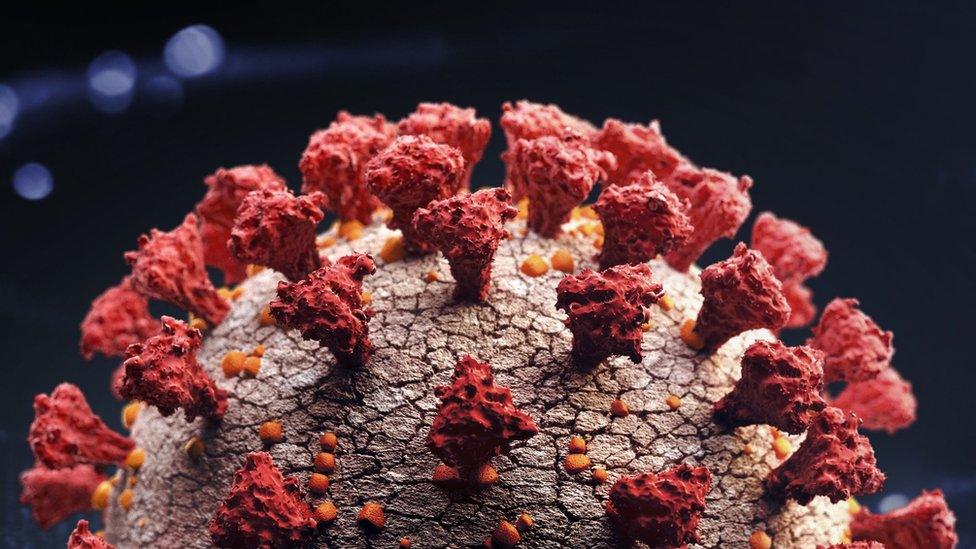
- Published16 December 2020
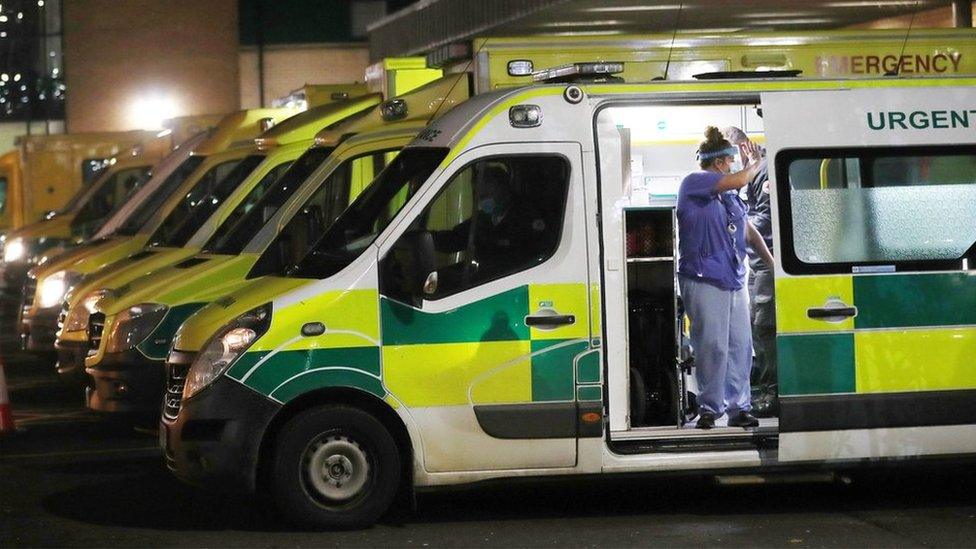
- Published16 December 2020
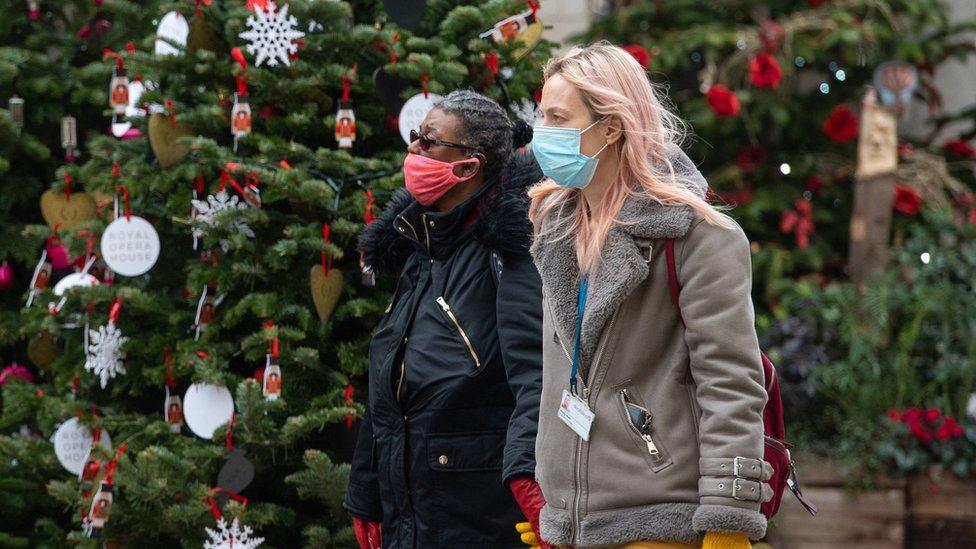
- Published25 November 2020
